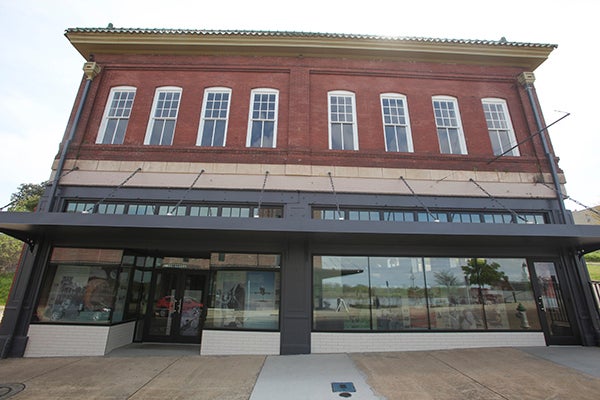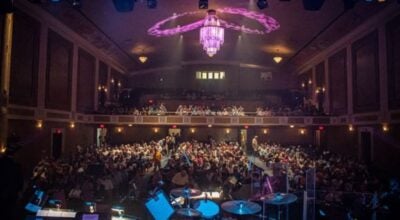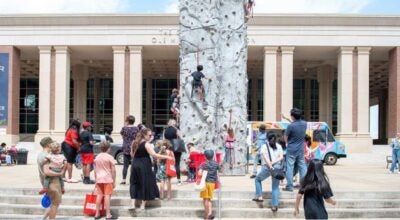Catfish Row Museum set to open in 2021, featuring state’s diverse cultures
Published 10:47 pm Friday, March 29, 2019

- The Monte Carlo building is seen in Downtown Friday (Courtland Wells/The Vicksburg Post)
The Catfish Row Museum is expected to open in 2021, owner and developer Linda Fondren said.
“We are hoping by fall of 2019 to have a ‘sneak preview’ for the community to preview some of the exhibits and cafe plans,” she added.
Linda and James Fondren bought the 108-year-old building at 913 Washington St. in 2014 from Vicksburg resident Malcolm Carson for $240,000 with plans to develop it into a multifaceted museum and interpretive center.
The Mississippi Legislature in 2016 approved a $500,000 grant for the museum project to help pay for renovations.
“Now that the outside of the building, architectural plans and a renovated space have been completed, we are working with our exhibit developer, Museum Concepts, to design the space for a museum lab and pop-up exhibition,” Fondren said.
The museum lab space, she said, will provide an opportunity for visitors to scan, copy and donate documents such as letters, recipes, and historic photographs; and to record oral history interviews.
“In the exhibition space, we will provide opportunities for community members to observe and provide feedback on how their artifacts and stories can be used in exhibits,” Fondren said.
“We will provide them with access to the tools that professional museum developers and designers use to gather assets — scanners and other recording and video devices. A series of public-facing events will include hands-on workshops, curatorial events, and panel discussions.”
She said the lab space could be open to the public in one to two months pending the time to purchase the equipment.
“We are putting the research staff together now and getting the equipment to begin taking oral histories and taking photographs and artifacts,” said Cissy Anklan of Museum Concepts of Clinton.
Anklan said the plan to tell Vicksburg’s story is based on an idea she had while reading “Becoming Southern,” by Christopher Morris, a professor at the University of Texas, which she said is a history about Vicksburg’s beginning.
“He said Vicksburg is such an unusual city in Mississippi; it’s not your typical Mississippi city,” she said.
“He said it simultaneously developed as a planter society and a mercantile society and that’s why you get the rich, rich diversity here of the different ethnic groups that were coming and the merchants, but you also have the deep south plantation owners and the African Americans.”
The old Mississippi, Anklan said, “Is a city like Vicksburg where it’s all happening at the same time, and that sort of sets Vicksburg apart. It’s not the Delta; it’s on the cusp of the Delta and all these great communities — the Lebanese, Chinese and Jewish, African American — that moved from Vicksburg into the Delta once the Delta became a viable community.”
The city’s story, she said, is going to be the actual citizens in Vicksburg, “And we’re going to tell the story by having them be part of our research and scan photos, and artifacts they lend us to reveal for visitors what makes Vicksburg unique; all this different diversity.
“It’s real exciting for me to tell the story of Vicksburg, or this particular slice of the story.”
Fondren said in November 2017 that tourism studies indicated an estimated 1.24 million people visit Vicksburg each year by car and boat making Vicksburg Mississippi’s biggest tourist attraction.
Vicksburg attracts visitors from all 50 states and nearly the same number of countries across the globe, and more than 500,000 people visit one of Mississippi’s greatest tourist magnets each year – the Vicksburg National Military Park.
In 2017, 103 riverboat cruises brought 26,000 passengers to Vicksburg, up from 75 dockings in 2016. In 2018, 120 dockings brought 25,000 people in 2018, and Visit Vicksburg anticipates 139 dockings bringing 30,000 people in 2019.
“The Catfish Row Museum will highlight the distinctive contributions of African-American as well as Lebanese, Jewish, Greek, Italian and Chinese communities,” Fondren said at the time.
“It will also provide a needed modern and lively venue for students and families to gather for programs to pass down traditions, knowledge, and skills to the next generation through partnerships with the farmers market and other cultural and educational organizations.”





